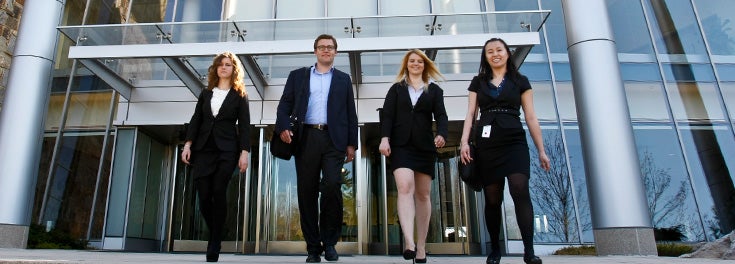
At URI, we’re known for reinventing the way we teach, creating new majors, and mixing disciplines to meet the world’s changing needs. Our latest reinvention is our One-Year Master of Business Administration Program, which Mark Higgins, dean of the College of Business Administration, calls “a breakthrough design.” We’ve also moved the program to the Feinstein Providence Campus, closer to the businesses and executives who will play a key role in the program’s strategic innovation-focused curriculum.
Employers have high expectations for MBA graduates. The new MBA program is expansive, offering a competitive advantage for students. ~Al Verrechia, chairman of the Hasbro Inc. board of directors.
The URI College of Business Administration has always been a leader. It was the state’s first accredited business school, the first accredited accounting program in the Northeast—and its original one-year, accelerated MBA program launched in 1995 was one of the first programs of its kind in the nation. But Dean Higgins wanted to make the traditional MBA more relevant in today’s marketplace. So he enlisted more than 20 faculty members to review the curriculum, survey national and regional employers, study market trends, and talk to students and alumni. The result is an innovative curriculum focused on managing, designing, and implementing strategic innovation. Once again, URI’s MBA is one of a kind—both academically and structurally.
“Employers have high expectations for MBA graduates in these ever-changing and demanding times,” said Al Verrechia ’67, MBA ’72 , chairman of the Hasbro Inc. board of directors. “The new MBA program is expansive, offering a competitive advantage for students. It will prepare them to use critical thinking and analytical skills on the job while applying practical, real world knowledge to confront the challenges businesses are facing on a global level.”
In a traditional MBA, students take five or six concurrent, 15-week courses, each in a distinct functional area taught by a different faculty member specializing in that area. Our new MBA curriculum is team-taught and emphasizes critical thinking, evidence-based decision making, and interpersonal communication across the functional areas of a modern corporation. Using a continuous improvement framework, each two-week module during the fall semester is built upon the module preceding it.
“Our new approach demonstrates to students that strategic decision making is not sequential, but rather interdisciplinary across all areas of a business. Disruptive innovation in business is becoming the rule, not the exception, and this new program will ensure our students can thrive and compete,” Higgins said.
Joyce Chau ’08 said the new approach was tough at first. “It felt like we were trying to learn everything at once, but seeing how the many different departments and aspects of business are connected, as well as having several professors from different disciplines leading the class together, is a great concept. I’m now trained as a generalist, and I feel I can look at business issues with a broader lens and see the bigger picture.”
In the spring semester, the program incorporates more unique features. First, students engage in a “live case” with executives from Hasbro, Inc., who share their company’s successful transformation from a toy manufacturer to a global entertainment company, giving them a real life context in which to apply their coursework. Students then form teams to work in a “business laboratory setting” with such established Rhode Island companies as Fidelity and GTECH as well as start-ups like G-Form to develop a new process, practice, or innovative product. The MBA team of Elizabeth Jarrell, Philipp Kluever, Anja Schnoor, and Joyce Chau (pictured above) is helping Fidelity Investments synthesize the practices and procedures of four business units that recently merged.
“They’ve analyzed patterns of communication, management structure, workflow blockages, and technological impediments in the communication among employees affected by the merge and between employees and Fidelity customers, said Professor Bjorn Carlsson. “They’ve interviewed employees at multiple Fidelity locations and researched industry practices. And using videoconferencing technology, they’ve presented their findings, recommendations, and implementation plan to Fidelity executives in Kentucky, Texas, Massachusetts, and Rhode Island.”
Joyce Chau, who will complete the program this summer, is delighted with the program and the experiences it has offered her. “It’s one thing to talk about ideas, tools, and concepts in class, but to be given the opportunity to work with a real company was perfect,” she said. “The instant feedback and constant push from the professors has helped me develop so much professionally. I enjoyed being exposed to the corporate environment and value the new connections I’ve made.”
